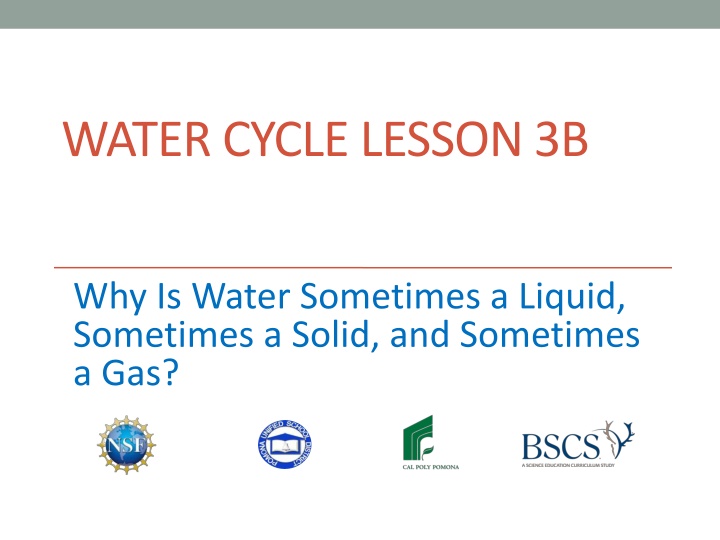
Water States: Liquid, Solid, Gas
Explore why water can exist as a liquid, solid, or gas through engaging lessons and simulations. Discover the properties and movements of water molecules across different states of matter.
Download Presentation

Please find below an Image/Link to download the presentation.
The content on the website is provided AS IS for your information and personal use only. It may not be sold, licensed, or shared on other websites without obtaining consent from the author. If you encounter any issues during the download, it is possible that the publisher has removed the file from their server.
You are allowed to download the files provided on this website for personal or commercial use, subject to the condition that they are used lawfully. All files are the property of their respective owners.
The content on the website is provided AS IS for your information and personal use only. It may not be sold, licensed, or shared on other websites without obtaining consent from the author.
E N D
Presentation Transcript
WATER CYCLE LESSON 3B Why Is Water Sometimes a Liquid, Sometimes a Solid, and Sometimes a Gas?
Unit Central Questions How does water change in the world around us? Does Earth ever run out of water?
Review: Changes in States of Matter What do we know so far about the states of matter and how water molecules change states? Turn and Talk: Discuss this question with a partner, listing as many ideas as you can in 3 minutes. Then we ll chart what you came up with.
Todays Focus Question Why is water sometimes a liquid, sometimes a solid, and sometimes a gas?
Water Molecules on the Move! Next we re going to watch a simulation (model) that shows what scientists have learned about how water molecules move in liquid, solid, and gaseous states. Link to simulation: https://phet.colorado.edu/en/simulation/states-of-matter
Your Observations As you watched each simulation, what did you notice about water molecules in the liquid, solid, and gaseous states? What similarities did you observe across the three states of matter? What differences did you observe across the three states of matter?
How Do Water Molecules Move? As we watch each simulation again, draw and write your observations on the handout.
Check Your Understanding 1. What state of matter do you think these water molecules are in? 2. What key words or (Use a complete sentence!) phrases could you use to describe water molecules in this state of matter?
Check Your Understanding 1. What state of matter do you think these water molecules are in? (Use a complete sentence!) 2. What key words or phrases could you use to describe water molecules in this state of matter?
Check Your Understanding 1. What state of matter do you think these water molecules are in? (Use a complete sentence!) 2. What key words or phrases could you use to describe water molecules in this state of matter?
Lets Summarize! Today s focus question: Why is water sometimes a liquid, sometimes a solid, and sometimes a gas? Write an answer to the focus question using ideas about how water molecules are arranged and move in liquid, solid, and gaseous states.
Next Time Today we learned about how water molecules move in different states of matter. Next time we ll use this knowledge to better explain how evaporation and condensation happen.






















